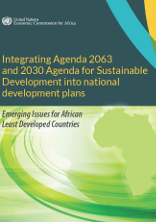Integrating Agenda 2063 and 2030 Agenda for Sustainable Development into national development plans

Following the global adoption of the 2030 Agenda for Sustainable Development and Agenda 2063, African Governments, supported by partners, including the Economic Commission for Africa (ECA), have begun the process of designing and implementing national development planning frameworks that are aligned with both initiatives. In addition, 34 African countries are classified as least developed countries and/or landlocked countries, and are thus tasked with the implementation of the Istanbul Programme of Action for the Least Developed Countries for the Decade 2011-2020. These global and regional development agendas are timely, given the high levels of poverty and inequality, in particular in Africa, excluding North Africa. Notwithstanding declines in recent years in the proportion of people living in poverty, the absolute numbers are increasing owing to a combination of high population growth rates and relatively weak growth, which is not inclusive.
Given the capacity and resource constraints in Africa, the implementation of and progress in reporting on the many internationally agreed initiatives pose a challenge. Governments need to coordinate and work with stakeholders, namely, the private sector, labour unions, civil society and development partners, to implement the global and regional development agendas alongside the national development plans and visions. The present paper provides perspectives on how policymakers can implement the global, regional and national agendas in a coherent and coordinated manner. It is informed by ongoing discussions between ECA staff and national authorities responsible for development planning, as well as the ECA concept paper on the alignment of the 2030 Agenda and Agenda 2063 with national development plans.